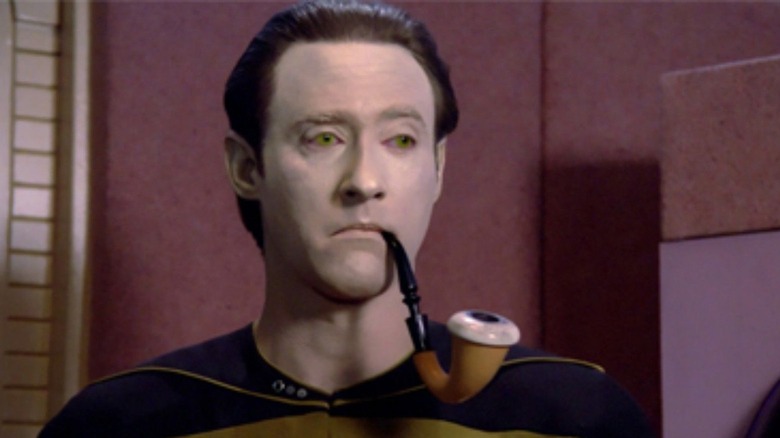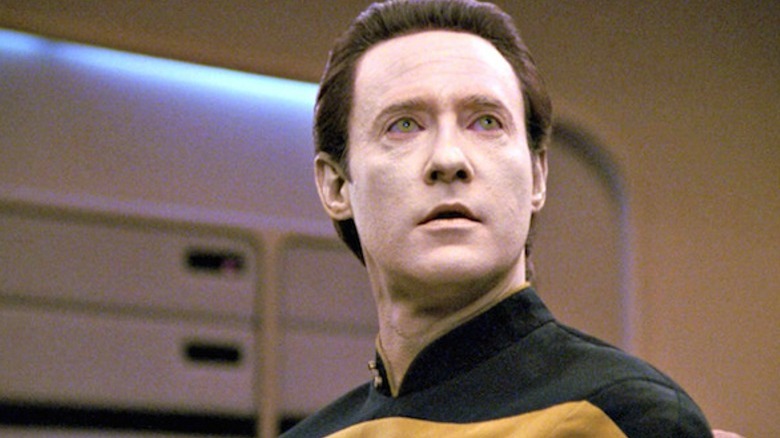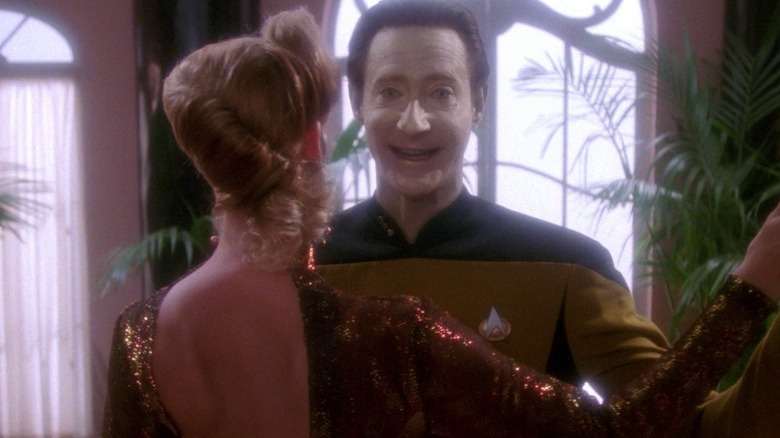A Star Trek Director Warned Brent Spiner That Data Would Be A 'Miserable' Role
The android Data was a key component within the cherished mosaic of "Star Trek: The Next Generation." The character fits snugly within the "Star Trek" ethos as a symbol of scientific progress and philosophical inquiry, while also fulfilling a deep emotional role as an artificial intelligence searching for humanity. Actor Brent Spiner had the daunting task to become the spiritual successor to Leonard Nimoy's highly logical yet humanistic Spock, but Data's loving reception is proof that he's a completely separate yet equally beloved force. Ironically, however, a director of one of the earliest episodes of "TNG" warned Spiner that the role wouldn't allow him enough range.
It was easy to dismiss Data as a Spock knockoff upon his debut. Whereas Vulcans are trained to control emotions in order to prioritize logic, here was a synthetic lifeform that was actually incapable of feeling emotions. Far from a one-note gimmick, however, Data's positronic brain turned out to be part of the heart and soul of the new "Star Trek." The classic season 2 episode "The Measure of a Man," which made the compelling case for Data's worth right to exist as a living being, was one of the show's finest moments and became the standard-bearer for the android's emotional characterization. Data eventually went out in a blaze of glory in the 2002 movie "Star Trek: Nemesis," although Spiner made a return in the Paramount+ series "Star Trek: Picard" as a wholly different sort of android that's only partly Data.
'You are gonna get so tired of this'
Speaking about the enduring legacy of Data after the character's reappearance in "Picard," Brent Spiner talked about how one of the directors of "The Next Generation" was unsure about his longevity. Speaking on The Ready Room, the after-show for "Picard," Spiner recalled how the director warned him that the role would be boring and unfulfilling:
"We had a director very early on, third episode or so, who said, 'You are gonna get so tired of this because it's gonna be the most limiting work you've ever done. I mean, you can't be emotional. You can't [...] You know, you're gonna hate this. By the seventh season, you're just gonna be miserable.' And I said, 'I don't think so.'"
Spiner obviously proved them wrong, but it's not difficult to see where this particular director was coming from. How could "TNG" create naturally human character growth for a character who's defined by his inability to naturally grow as a human?
What it means to be a human
Brent Spiner took advice from "Star Trek" architect Gene Roddenberry, who saw Data as a sympathetic and sort of tragic figure who could never truly become human, as much as he tried. The actor explained:
"As it turned out, fortunately, he [the director] was wrong. And I just saw that, you know, the canvas was smaller, but I had the opportunity to paint every, you know, inch of it. And so it grew as it went on, as Data grew. You know, as he absorbed information and knowledge about what it means to be a human. That's where I went too. And I think the most telling thing for me, I mean, the thing that I think was true in the beginning and true to the end of 'Picard,' is something Gene [Roddenberry] said to me right off the bat. He said, 'Here's what I want from Data.' He said, 'Through the series, as long as it goes, however long you play this, Data is going to get closer and closer and closer to being human. And at the end of the day, still not.' And I think that's where we've gone."
It's a complicated interpretation of a character that may not seem very deep on the surface. Data's curiosity fell somewhere between cold, analytical observation and childlike whimsy, and Spiner always struck that balance depending on what the situation called for. Data's lack of emotion could be awkwardly (and humorously) unsettling on occasion, but Spiner always won hearts with an episode like "Data's Day" or a moment like his Ode to Spot. The android added a spark of life to "Star Trek" that was far from miserable.


